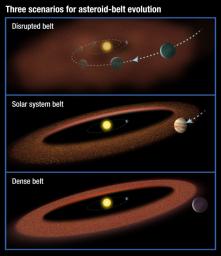
|
Scenarios for the Evolution of Asteroid Belts
- Click the image above for a larger view
- Full-Res JPEG (2100 x 2429) (616.5 kB)
- Full-Res TIFF (2100 x 2429) (15.3 MB)
Caption:
This illustration shows three possible scenarios for the evolution of asteroid belts. In the top panel, a Jupiter-size planet migrates through the asteroid belt, scattering material and inhibiting the formation of life on planets. The second scenario shows our solar-system model: a Jupiter-size planet that moves slightly inward but is just outside the asteroid belt. In the third illustration, a large planet does not migrate at all, creating a massive asteroid belt. Material from the hefty asteroid belt would bombard planets, possibly preventing life from evolving.
New research based on an analysis of theoretical models and archival observations, including infrared data from NASA's Spitzer Space Telescope, suggests that the second scenario may also be important for the development of life in other solar systems.
Background Info:
JPL manages the Spitzer Space Telescope mission for NASA's Science Mission Directorate, Washington. Science operations are conducted at the Spitzer Science Center at Caltech. Data are archived at the Infrared Science Archive housed at the Infrared Processing and Analysis Center at Caltech.
For more information about Spitzer, visit http://spitzer.caltech.edu and http://www.nasa.gov/spitzer .
Cataloging Keywords:
| Name | Value | Additional Values |
|---|---|---|
| Target | ||
| System | ||
| Target Type | Exoplanet | |
| Mission | Spitzer Space Telescope | |
| Instrument Host | Spitzer Space Telescope | |
| Host Type | Space Telescope | |
| Instrument | ||
| Detector | ||
| Extra Keywords | Color, Infrared | |
| Acquisition Date | ||
| Release Date | 2012-11-01 | |
| Date in Caption | ||
| Image Credit | NASA/ESA/STScI | |
| Source | photojournal.jpl.nasa.gov/catalog/PIA16212 | |
| Identifier | PIA16212 | |
